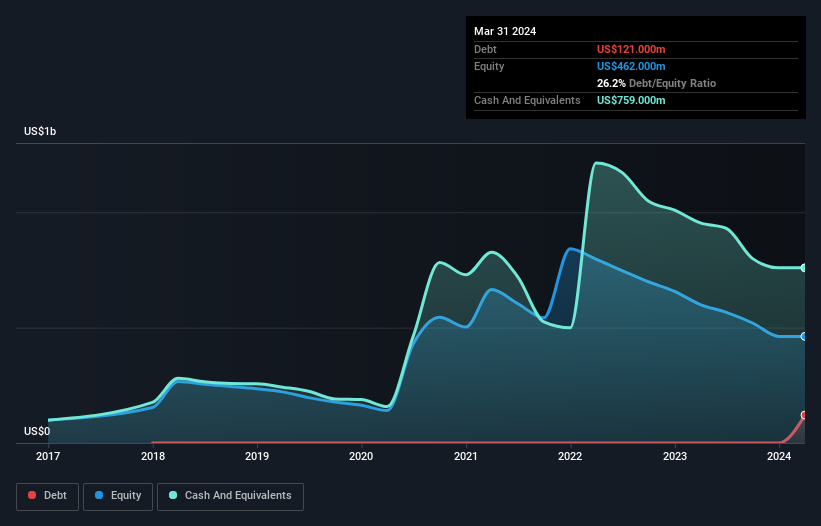- United States
- /
- Biotech
- /
- NYSE:RCUS
Here's Why Arcus Biosciences (NYSE:RCUS) Can Manage Its Debt Despite Losing Money
Some say volatility, rather than debt, is the best way to think about risk as an investor, but Warren Buffett famously said that 'Volatility is far from synonymous with risk.' It's only natural to consider a company's balance sheet when you examine how risky it is, since debt is often involved when a business collapses. We can see that Arcus Biosciences, Inc. (NYSE:RCUS) does use debt in its business. But the more important question is: how much risk is that debt creating?
When Is Debt Dangerous?
Debt and other liabilities become risky for a business when it cannot easily fulfill those obligations, either with free cash flow or by raising capital at an attractive price. If things get really bad, the lenders can take control of the business. However, a more frequent (but still costly) occurrence is where a company must issue shares at bargain-basement prices, permanently diluting shareholders, just to shore up its balance sheet. Of course, plenty of companies use debt to fund growth, without any negative consequences. When we examine debt levels, we first consider both cash and debt levels, together.
See our latest analysis for Arcus Biosciences
What Is Arcus Biosciences's Net Debt?
The image below, which you can click on for greater detail, shows that at December 2023 Arcus Biosciences had debt of US$121.0m, up from none in one year. But on the other hand it also has US$759.0m in cash, leading to a US$638.0m net cash position.

How Strong Is Arcus Biosciences' Balance Sheet?
Zooming in on the latest balance sheet data, we can see that Arcus Biosciences had liabilities of US$184.0m due within 12 months and liabilities of US$449.0m due beyond that. Offsetting these obligations, it had cash of US$759.0m as well as receivables valued at US$42.0m due within 12 months. So it can boast US$168.0m more liquid assets than total liabilities.
This short term liquidity is a sign that Arcus Biosciences could probably pay off its debt with ease, as its balance sheet is far from stretched. Succinctly put, Arcus Biosciences boasts net cash, so it's fair to say it does not have a heavy debt load! When analysing debt levels, the balance sheet is the obvious place to start. But it is future earnings, more than anything, that will determine Arcus Biosciences's ability to maintain a healthy balance sheet going forward. So if you're focused on the future you can check out this free report showing analyst profit forecasts.
In the last year Arcus Biosciences wasn't profitable at an EBIT level, but managed to grow its revenue by 99%, to US$237m. Shareholders probably have their fingers crossed that it can grow its way to profits.
So How Risky Is Arcus Biosciences?
By their very nature companies that are losing money are more risky than those with a long history of profitability. And the fact is that over the last twelve months Arcus Biosciences lost money at the earnings before interest and tax (EBIT) line. Indeed, in that time it burnt through US$330m of cash and made a loss of US$231m. But at least it has US$638.0m on the balance sheet to spend on growth, near-term. With very solid revenue growth in the last year, Arcus Biosciences may be on a path to profitability. By investing before those profits, shareholders take on more risk in the hope of bigger rewards. The balance sheet is clearly the area to focus on when you are analysing debt. But ultimately, every company can contain risks that exist outside of the balance sheet. For example, we've discovered 3 warning signs for Arcus Biosciences that you should be aware of before investing here.
At the end of the day, it's often better to focus on companies that are free from net debt. You can access our special list of such companies (all with a track record of profit growth). It's free.
New: Manage All Your Stock Portfolios in One Place
We've created the ultimate portfolio companion for stock investors, and it's free.
• Connect an unlimited number of Portfolios and see your total in one currency
• Be alerted to new Warning Signs or Risks via email or mobile
• Track the Fair Value of your stocks
Have feedback on this article? Concerned about the content? Get in touch with us directly. Alternatively, email editorial-team (at) simplywallst.com.
This article by Simply Wall St is general in nature. We provide commentary based on historical data and analyst forecasts only using an unbiased methodology and our articles are not intended to be financial advice. It does not constitute a recommendation to buy or sell any stock, and does not take account of your objectives, or your financial situation. We aim to bring you long-term focused analysis driven by fundamental data. Note that our analysis may not factor in the latest price-sensitive company announcements or qualitative material. Simply Wall St has no position in any stocks mentioned.
About NYSE:RCUS
Arcus Biosciences
A clinical-stage biopharmaceutical company, develops and commercializes cancer therapies in the United States.
Excellent balance sheet and fair value.
Market Insights
Weekly Picks


Crazy Undervalued 42 Baggers Silver Play (Active & Running Mine)


Fiducian: Compliance Clouds or Value Opportunity?

Willamette Valley Vineyards (WVVI): Not-So-Great Value
Recently Updated Narratives

PRME remains a long shot but publication in the New England Journal of Medicine helps.

This one is all about the tax benefits

Estimated Share Price is $79.54 using the Buffett Value Calculation
Popular Narratives


MicroVision will explode future revenue by 380.37% with a vision towards success


NVDA: Expanding AI Demand Will Drive Major Data Center Investments Through 2026




